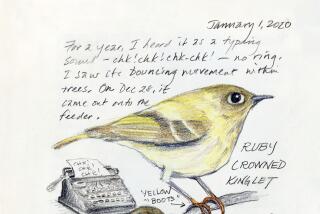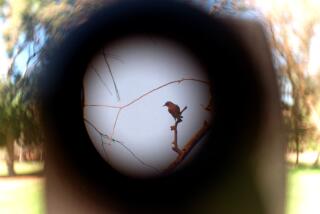Bird Tamer Unruffles Pet/Owner Relations
- Share via
Got a macaw with an attitude or a parakeet with issues? Have a cockatiel that only a masochist could love? Ken Globus, who calls himself the Bird Whisperer, says he can turn them into, well, pussycats.
His unusual occupation involves breaking through what he calls a bird’s “bubble of fear.” In the wild, he said, birds in the parrot family are prey and tend to be afraid of just about everything. Globus tries to calm them by making them confront their fears.
He demonstrated his $100-an-hour technique at the home of a bird-loving friend in Woodland Hills. As a foot-long cockatoo screeched like a demented rock fan in a nearby cage, Globus approached Popcorn, another umbrella cockatoo that was in foster care awaiting adoption. He quickly got the skittish Popcorn, whom he had never seen before, to perch on his hand.
“Conventional wisdom says, ‘Never force a bird,’” said Globus, who writes screenplays when not taming birds. “I’m completely opposite.”
There are about 15 million pet birds in the United States, according to the American Veterinary Medical Assn.
“People often buy birds as furniture or artwork--because they’re pretty,” Globus said. But many owners soon discover they cannot live with a screaming cockatoo or a parrot that attacks every time they try to clean its cage.
Globus always brings the owner into a training session. After all, he or she is the one who must live with the bird. “It’s a very emotional thing,” he said of the process of bringing bird and owner together. “It’s not unusual for there to be tears.”
Bird owners seek professional help mostly for biting, screaming, rivalry with other birds, jealousy of humans and feather plucking, said Larry Lachman, coauthor of “Birds Off the Perch: Therapy and Training for Your Pet Bird,” to be published by Simon & Schuster.
Lachman, who has a doctorate in human psychology, said he knows of only half a dozen people with national reputations for improving bird behavior, and he was unfamiliar with Globus.
Because bird trainers are unregulated, Lachman said, “it’s buyer beware.”
Globus, who has his own Web site (www.thebirdwhisperer.com), described his method as assertive and hands-on.
Getting the bird to accept handling is essential to making it a good companion. To do that, Globus turns Popcorn, now considerably less ornery, on its back, holding it firmly and vibrating his other hand over it. Popcorn doesn’t fuss or struggle, even in this odd position.
A large cockatoo can come down on a finger like a feathered pit bull, but Globus is blase about minor injuries.
“I get bitten all the time,” he said. “Sometimes I’ll induce a bird to bite me to show the owner how to respond to the worst-case scenario.” His advice: Never pull back or show fear.
A Los Angeles native, Globus got involved with birds 20 years ago. His parents sold tropical fish, and when they expanded their shop, he suggested they sell other creatures. They added birds.
“I learned it from the birds,” Globus said of his unusual technique. “I try things, and the feedback from the birds leads me on the path.”
Stephanie Reitzenstein, long active in the West San Fernando Valley Bird Society, rescues abandoned parrots and other species.
A couple of years ago, she said, she was taking care of a feisty eclectus parrot named Ruby who repeatedly bit her. She asked Globus if he could make Ruby behave. “He did it in about an hour, and she never went back to being horrible,” Reitzenstein said. She looked at Globus and announced, “You’re the Bird Whisperer!”
More to Read
Sign up for Essential California
The most important California stories and recommendations in your inbox every morning.
You may occasionally receive promotional content from the Los Angeles Times.













